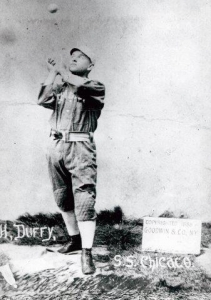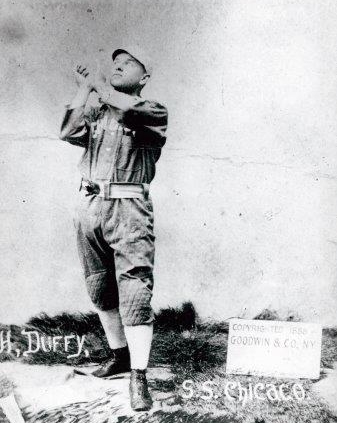April 23, 1892: Sweep continues strong season start for Beaneaters
 There was a lot of change after the 1891 season. The National League had grown from eight to 12 teams with the acceptance of four American Association teams as the Association folded as a major league.
There was a lot of change after the 1891 season. The National League had grown from eight to 12 teams with the acceptance of four American Association teams as the Association folded as a major league.
One thing didn’t change for the expanded National League – the Boston Beaneaters remained the best team in the League. The Beaneaters, who won the League title in 1891 with an 87-51-2 record, were expected to repeat as champions.
Going into their first homestand of the 1892 season, the Beaneaters were 3-1. The first nine days of the season had been disrupted by poor weather. After opening with a 14-4 victory at Washington, the Beaneaters played just once (an 11-5 victory over the Orioles in Baltimore on April 16) over the next six days.
The Beaneaters split two games in Philadelphia before returning to Boston for their home opener on April 21. The game was threatened by rain and played in less than ideal conditions. A crowd of 3,825 turned out for the Beaneaters and Orioles, who had created the first controversy of the season before leaving Baltimore the day before.
Leading 6-5 in the sixth inning of their game with the New York Giants, the Orioles refused to finish their game, saying they had to catch a train for Boston. The Giants claimed they had not been notified by the Orioles and protested. Umpire Jerry Mahoney ruled the game a forfeit to the Giants.
The Orioles, who had finished fourth in the American Association in 1891 with a 71-64-4 record, made it Boston in time for their first road game of the season. Opening Day was a big event for the defending National League champions and the city of Boston.
“Despite the rain, however, Governor William E. Russell and staff, Mayor Matthews and the board of aldermen and councilmen, over one-half of the Massachusetts senate and fully 100 members of the house, besides clergymen, pastors and lawyers of note, occupied prominent seats in the grand stand. Indeed, the Massachusetts legislature adjourned at noon to attend the game.”1
The Beaneaters edged the Orioles, 7-6, to improve to 4-1. The loss dropped the Orioles to 1-5. Another rainout the next day forced the teams to schedule a doubleheader on April 23.
The doubleheader would test the patience of the local cranks before the Beaneaters emerged with a sweep via 11-7 and 19-9 victories.
A newspaper account of the doubleheader succinctly summed up the day’s proceedings: “The champions took four hours and 20 minutes practice at the South End grounds yesterday, having the Baltimore team to fill the role of punching bag. The home team put up by far the best game, and by reason of their superior headwork, have two more victories on their string.”2
While the games weren’t long by twenty-first-century standards – game one was played in 1 hour and 58 minutes and the second game was played in 2 hours and 10 minutes – they were likely tedious for the crowd of 4,326. The teams combined for 25 errors, nine in the first game and 16 (12 by the Orioles) in the second game.
In the first game, Jack Stivetts made his pitching debut for the Beaneaters. Stivetts, who had spent the previous three seasons with the St. Louis Browns of the American Association, signed with Boston during the offseason and bolstered a pitching staff that included future Hall of Famers John Clarkson and Kid Nichols. When not pitching, Stivetts played in the outfield.
Stivetts, a 24-year-old right-hander, allowed just five hits, walked six, hit a batter, and had to weather five errors by his defense in the victory. The Orioles scored three runs in the first inning, but Stivetts settled down with four scoreless innings as the Beaneaters scored six in the fourth and two in the fifth to take an 8-3 lead. After the Orioles scored two in the sixth, Boston scored three in the seventh to open an 11-5 lead. The Orioles scored two in the seventh. None of the Orioles’ runs were earned.
Stivetts finished strong, retiring the Orioles in order over the final two innings. “It was one, two, three (in) order in the eighth and ninth, Stivetts putting on steam and mowing them down with ease,” reported the Boston Globe.3
The Beaneaters took control with their six-run fourth inning. Shortstop Herman Long opened the fourth with a double and future Hall of Famer Hugh Duffy reached on an error. Bobby Lowe hit a grounder to third baseman George Shoch, who threw to home to get Long, but Long returned to third base safely to load the bases. A single by Tommy McCarthybrought in the first two runs. After a sacrifice moved the runners up, Charlie Bennett’s line drive to center field scored two more runs. Stivetts closed out the inning’s scoring with a two-run single.
The Beaneaters added two runs in the fifth on a single by Lowe, a double by McCarthy and a wild pitch.
In the Orioles’ subsequent at-bat, Lew Whistler hit a leadoff triple, but Lowe made a running catch in left-center field of a line drive and threw out Lew Whistler, who had tripled to lead off the inning, at home.
The Beaneaters final three runs came on two walks, a sacrifice, a single by Tommy Tucker and a double by Joe Quinn.
McCarthy, in his first season with the Beaneaters after four seasons with the St. Louis Browns, had three of Boston’s 11 hits.
In the second game, the Beaneaters combined 13 hits with the Orioles’ fielding problems to earn the victory. Only five of Boston’s 19 runs were earned.
“Baltimore out batted Boston in the second game, but fielded miserably. Boston’s base running was an important winning element in both games.”4
After a five-minute break between games, Lowe got things started in the second game (the Beaneaters batted first) with a two-run home run to left. But the Orioles scored four runs in their half of the first on a walk, error four singles and a double to take a short-lived 4-2 lead.
The Beaneaters quickly added six runs in the second on singles by Quinn, Tucker, and Clarkson, a walk, a hit batsman, and two errors.
Tucker added a double in the Beaneaters’ three-run eighth inning, and singles by Duffy and Billy Nash highlighted their three-run ninth inning.
Nash had four hits and Duffy, who had hit .336 in 1891 for the American Association champion Boston Reds, had three hits to lead the Beaneaters offense. The Beaneaters stole seven bases – three by Duffy and two by Nash – while Orioles starter George Cobb walked seven.
The Orioles had 15 hits off Clarkson, who was making his third start of the season. But only two of Baltimore’s nine runs were earned. Clarkson, who was 33-19 with a 2.79 ERA in 47 complete games for Boston in 1891, also walked seven.
Shoch and George Wood each had three hits for the Orioles.
After the doubleheader, the Beaneaters went on the road and won four more games to stretch their winning streak to eight games. They were 11-2 in the first month of the season.
Sources
In addition to the sources cited in the notes, the author also consulted Newspapers.com and Retrosheet.org.
Notes
1 “Sporting News,” Brooklyn Daily Eagle, April 22, 1892: 1.
2 “Double Dirge,” Boston Globe, April 24, 1892: 4.
3 Ibid.
4 “Baltimore Pushed Further Down the Line,” Brooklyn Daily Eagle, April 24, 1892: 7.
Additional Stats
Boston Beaneaters 11
Baltimore Orioles 7
Boston Beaneaters 19
Baltimore Orioles 9
South End Grounds
Boston, MA
Corrections? Additions?
If you can help us improve this game story, contact us.


